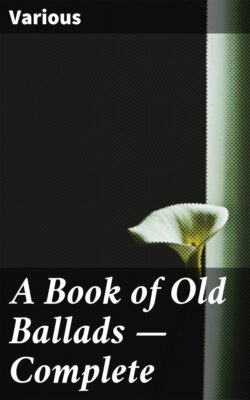Читать книгу A Book of Old Ballads — Complete - Various - Страница 12
На сайте Литреса книга снята с продажи.
VIII
ОглавлениеTable of Contents
But if the generation to come will learn a great deal from the few
popular ballads which we are still creating in our music-halls, how much
more shall we learn of history from these ballads, which rang through
the whole country, and were impregnated with the spirit of a whole
people! These ballads are history, and as such they should be recognised.
It has always seemed to me that we teach history in the wrong way. We
give boys the impression that it is an affair only of kings and queens
and great statesmen, of generals and admirals, and such-like bores.
Thousands of boys could probably draw you a map of many pettifogging
little campaigns, with startling accuracy, but not one in a thousand
could tell you what the private soldier carried in his knapsack. You
could get sheaves of competent essays, from any school, dealing with
such things as the Elizabethan ecclesiastical settlement, but how many
boys could tell you, even vaguely, what an English home was like, what
they ate, what coins were used, how their rooms were lit, and what they
paid their servants?
In other words, how many history masters ever take the trouble to sketch
in the great background, the life of the common people? How many even
realize their existence, except on occasions of national disaster, such as the Black Plague?
A proper study of the ballads would go a long way towards remedying this
defect. Thomas Percy, whose Reliques must ever be the main source of our information on all questions connected with ballads, has pointed out that all the great events of the country have, sooner or later, found their way into the country's song-book. But it is not only the resounding names that are celebrated. In the ballads we hear the echoes of the street, the rude laughter and the pointed jests. Sometimes these ring so plainly that they need no explanation. At other times, we have to go to Percy or to some of his successors to realize the true significance of the song.
For example, the famous ballad "John Anderson my Jo" seems, at first
sight, to be innocent of any polemical intention. But it was written
during the Reformation when, as Percy dryly observes, "the Muses were
deeply engaged in religious controversy." The zeal of the Scottish
reformers was at its height, and this zeal found vent in many a pasquil
discharged at Popery. It caused them, indeed, in their frenzy, to
compose songs which were grossly licentious, and to sing these songs in
rasping voices to the tunes of some of the most popular hymns in the
Latin Service.
"John Anderson my Jo" was such a ballad composed for such an occasion.
And Percy, who was more qualified than any other man to read between the
lines, has pointed out that the first stanza contains a satirical
allusion to the luxury of the popish clergy, while the second, which
makes an apparently light reference to "seven bairns", is actually
concerned with the seven sacraments, five of which were the spurious
offspring of Mother Church.
Thus it was in a thousand cases. The ballads, even the lightest and most
blossoming of them, were deep-rooted in the soil of English history. How
different from anything that we possess to-day! Great causes do not lead
men to song, nowadays they lead them to write letters to the newspapers.
A national thanksgiving cannot call forth a single rhyme or a single bar
of music. Who can remember a solitary verse of thanksgiving, from any of
our poets, in commemoration of any of the victories of the Great War?
Who can recall even a fragment of verse in praise of the long-deferred
coming of Peace?
Very deeply significant is it that our only method of commemorating
Armistice Day was by a two minutes silence. No song. No music. Nothing.
The best thing we could do, we felt, was to keep quiet.
